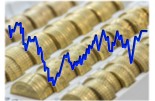La Française: A confidence boost?

Improved economic situation in Europe and China
The sharp fall in gas prices since mid-December has allowed us to ward off the spectre of a deep recession in Europe caused by energy supply disruptions. Better yet, the mild temperatures allowed us to restock gas supplies at a time when stocks usually decline significantly due to high levels of consumption.
Temperatures have since dropped, and stocks have started to fall again, but that doesn't change the outcome: supply issues are behind us for winter 2022 and perhaps even for winter 2023.
At the same time, each day, we witness the benefits of the Chinese economy opening back up, with mobility statistics rising sharply and a political will that does not seem to be waning. The latest PMIs seem to confirm this recovery in activity, especially in the services sector.
Even though it is still too early to draw definitive conclusions, it is very likely that there will be no turning back by the Chinese authorities. What are the consequences of the Chinese economy reopening? This will likely result in a strong recovery in Chinese consumption over the coming months, in similar fashion to events in Europe and the United States.
The excess savings rate in China is currently estimated to stand at about 2 to 4% of Chinese GDP, which is lower than the rate in Europe, but is nevertheless still significant.
All of this has logically caused a recovery in leading indicators in the euro area, such as the Sentix, IFO and ZEW as well as growth revisions to be revised upwards, as we have seen with the latest IMF forecasts. It is also likely that these upward revisions will continue in the coming weeks, in contrast to the level of forecasters' pessimism at the end of last year.
So is everything looking better? For now – yes. The situation has undeniably improved and it should continue to do so in the coming months given the marked recovery in the above-mentioned surveys. German exports, in particular, should benefit from the Chinese economy acceleration.
The impact of monetary tightening on economies remains uncertain
The next question that arises, has to do with the impact of the monetary tightening that central banks have undertaken over the last nine months or so. The lag between more restrictive financial conditions and its negative impact on the economy is not a variable known a priori. The various studies estimate that this lag can be quite long – i.e. between 12 and 36 months.
Last December, the Federal Reserve of Kansas City carried out a study on this lag and estimates that it could however be shorter in the United States due to the shrinking balance sheet of the American Federal Reserve.
However, the 'Bank Lending Survey', published by the ECB a few days ago, already shows some deterioration in credit conditions within the euro area between Q3 and Q4 2022. This deterioration in access to credit has affected both companies and consumers alike, whereby – unsurprisingly – the real estate market has suffered the most.
The context is therefore not particularly clear-cut for central banks, in particular the European Central Bank, against a backdrop of upward growth revisions in the short term, signs of disinflation becoming more visible but core inflation remaining too high, while monetary tightening already seems to have had a significant impact on credit conditions.
There is no doubt that the debates will be tense during the next monetary policy meetings, in particular in March with the new macroeconomic forecasts. Nevertheless, we are still leaning towards lower rates over time, as we believe the disinflationary effect should gradually spread to core inflation.
February Outlook
The medium-term risk to economic growth remains due to the as yet unknown impact of tighter monetary policies. However, our view remains positive as the upcoming disinflation, less restrictive central banks, the reopening of the Chinese economy and a still weak market position are all favourable arguments in the short term.









